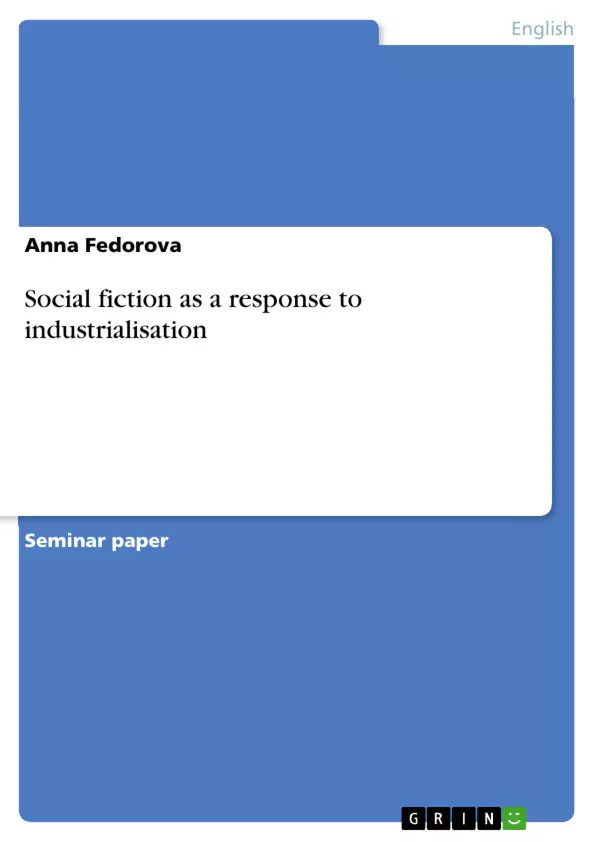Industrialisation influenced social, political and cultural principles of the British society of that time in different ways. As a reaction to social and historical changes in the country some new literary forms came into being. Literary critics of the Victorian period put emphasis on the social novel as the most common narrative form of the time. The reason for predominance of this literary genre seems to be obvious: the social novel is “the vehicle best equipped to present a picture of life lived a given society.” However, the phenomenon of the popularity of the social novel and its contribution to the development of the new value system cannot be explained in one sentence.
In this paper I am going to illustrate in which ways the social novel as a literary genre responded to industrial processes in terms of its themes and attitudes.
The relation between literature and society is always a two-way relation. On the one hand, the social novel was seen as “a mirror of social changes”; on the other hand, it fulfilled certain functions aimed to influence the society in different ways. The second part of my paper deals with the function of the social novel.
Since my aims are concerned with the general description of the social novel as a genre, I will not give a detailed analysis of individual novels. To illustrate my arguments by examples, I used “North and South” by E. Gaskell and “Hard Times” by C. Dickens. Both novels appear to be the clear representatives of the genre.
Inhaltsverzeichnis (Table of Contents)
- Introduction
- The reflection of social changes in fictional works
- From rural society to urbanization
- The representation of the class society
- Class struggle as one of the main themes of the English industrial novel
- The functions of the social novel
- Social criticism in the novel
- Social novel as entertainment
- The moral function of the social novel
- Conclusion
Zielsetzung und Themenschwerpunkte (Objectives and Key Themes)
This paper aims to demonstrate how the social novel as a literary genre responded to industrial processes in terms of its themes and attitudes. It explores the two-way relationship between literature and society, illustrating how the social novel reflected social changes while also fulfilling certain functions to influence society.Key themes explored in the paper include:
- The depiction of urbanization and the transition from rural society in industrial novels
- The portrayal of class society and the emergence of new social structures
- The role of the social novel in social criticism and its impact on societal values
- The different functions of the social novel, including entertainment and moral instruction
Zusammenfassung der Kapitel (Chapter Summaries)
Introduction
The introduction establishes the context of industrialisation in Britain and its impact on social, political, and cultural principles. It highlights the emergence of the social novel as a response to these changes and emphasizes its prevalence during the Victorian period. The introduction also discusses the two-way relationship between literature and society, acknowledging that the social novel serves as a reflection of social changes and a tool for influencing society.The reflection of social changes in fictional works
This chapter delves into how industrialisation is depicted in social novels. It uses the contrast between rural and urban settings to illustrate the changing landscape of Britain. The chapter examines the representation of class society, highlighting the emergence of the landed aristocracy, bourgeoisie, and working class as distinct social groups.The functions of the social novel
This chapter explores the various functions of the social novel. It examines the genre's role in social criticism, its potential for entertainment, and its ability to promote moral values. The chapter emphasizes the importance of the social novel in shaping public opinion and influencing societal norms.Schlüsselwörter (Keywords)
The main keywords and focus topics of this paper include social novel, industrial novel, urbanization, class society, social criticism, entertainment, moral function, Victorian period, industrialisation, rural society, and British society.Frequently Asked Questions
How did the social novel respond to the Industrial Revolution?
The social novel acted as a "mirror of social changes," reflecting the transition from rural to urban society and the emergence of new class structures.
Which specific novels are analyzed in this paper?
The paper uses "North and South" by Elizabeth Gaskell and "Hard Times" by Charles Dickens as clear representatives of the genre.
What are the primary functions of the Victorian social novel?
It served three main functions: social criticism, entertainment for the public, and moral instruction or shaping of societal values.
What were the main themes of the English industrial novel?
Main themes include urbanization, class struggle between the bourgeoisie and the working class, and the moral consequences of industrial growth.
Why was the social novel the predominant literary form of that time?
It was considered the best vehicle to present a comprehensive picture of life within a rapidly changing given society.
- Quote paper
- MA Anna Fedorova (Author), 2005, Social fiction as a response to industrialisation, Munich, GRIN Verlag, https://www.grin.com/document/113588



